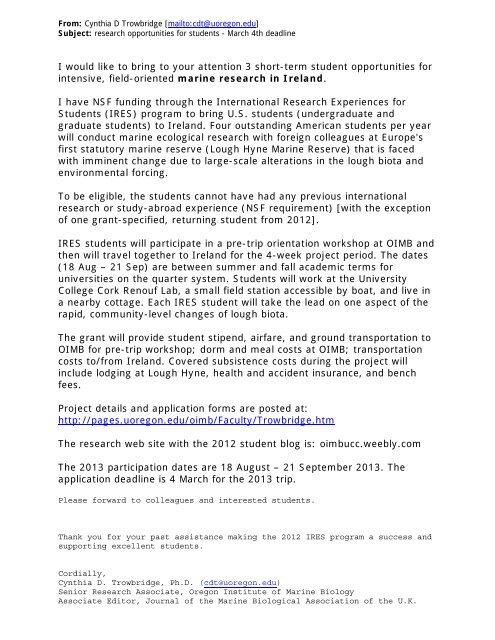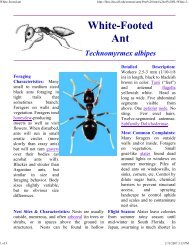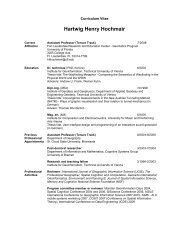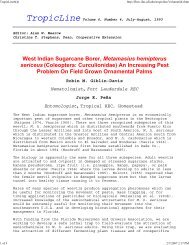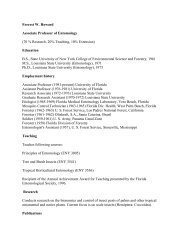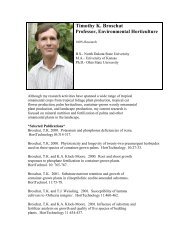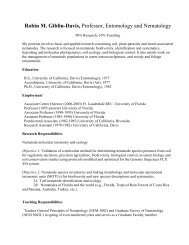I would like to bring to your attention 3 short-term student ...
I would like to bring to your attention 3 short-term student ...
I would like to bring to your attention 3 short-term student ...
Create successful ePaper yourself
Turn your PDF publications into a flip-book with our unique Google optimized e-Paper software.
From: Cynthia D Trowbridge [mail<strong>to</strong>:cdt@uoregon.edu]<br />
Subject: research opportunities for <strong>student</strong>s - March 4th deadline<br />
I <strong>would</strong> <strong>like</strong> <strong>to</strong> <strong>bring</strong> <strong>to</strong> <strong>your</strong> <strong>attention</strong> 3 <strong>short</strong>-<strong>term</strong> <strong>student</strong> opportunities for<br />
intensive, field-oriented marine research in Ireland.<br />
I have NSF funding through the International Research Experiences for<br />
Students (IRES) program <strong>to</strong> <strong>bring</strong> U.S. <strong>student</strong>s (undergraduate and<br />
graduate <strong>student</strong>s) <strong>to</strong> Ireland. Four outstanding American <strong>student</strong>s per year<br />
will conduct marine ecological research with foreign colleagues at Europe's<br />
first statu<strong>to</strong>ry marine reserve (Lough Hyne Marine Reserve) that is faced<br />
with imminent change due <strong>to</strong> large-scale alterations in the lough biota and<br />
environmental forcing.<br />
To be eligible, the <strong>student</strong>s cannot have had any previous international<br />
research or study-abroad experience (NSF requirement) [with the exception<br />
of one grant-specified, returning <strong>student</strong> from 2012].<br />
IRES <strong>student</strong>s will participate in a pre-trip orientation workshop at OIMB and<br />
then will travel <strong>to</strong>gether <strong>to</strong> Ireland for the 4-week project period. The dates<br />
(18 Aug – 21 Sep) are between summer and fall academic <strong>term</strong>s for<br />
universities on the quarter system. Students will work at the University<br />
College Cork Renouf Lab, a small field station accessible by boat, and live in<br />
a nearby cottage. Each IRES <strong>student</strong> will take the lead on one aspect of the<br />
rapid, community-level changes of lough biota.<br />
The grant will provide <strong>student</strong> stipend, airfare, and ground transportation <strong>to</strong><br />
OIMB for pre-trip workshop; dorm and meal costs at OIMB; transportation<br />
costs <strong>to</strong>/from Ireland. Covered subsistence costs during the project will<br />
include lodging at Lough Hyne, health and accident insurance, and bench<br />
fees.<br />
Project details and application forms are posted at:<br />
http://pages.uoregon.edu/oimb/Faculty/Trowbridge.htm<br />
The research web site with the 2012 <strong>student</strong> blog is: oimbucc.weebly.com<br />
The 2013 participation dates are 18 August – 21 September 2013. The<br />
application deadline is 4 March for the 2013 trip.<br />
Please forward <strong>to</strong> colleagues and interested <strong>student</strong>s.<br />
Thank you for <strong>your</strong> past assistance making the 2012 IRES program a success and<br />
supporting excellent <strong>student</strong>s.<br />
Cordially,<br />
Cynthia D. Trowbridge, Ph.D. (cdt@uoregon.edu)<br />
Senior Research Associate, Oregon Institute of Marine Biology<br />
Associate Edi<strong>to</strong>r, Journal of the Marine Biological Association of the U.K.
International<br />
Research Experiences for Students (IRES):<br />
Imminent change in a European marine reserve<br />
18 Aug - 21 Sep 2013<br />
Applicaon forms available at<br />
hp://pages.uoregon.edu/oimb/Faculty/Trowbridge.htm<br />
Objectives: No-take marine reserves are important <strong>to</strong>ols <strong>to</strong> learn about marine systems and<br />
<strong>to</strong> protect areas for future generations. These ideas, encapsulated by national and regional<br />
marine reserve programs, offer an ideal opportunity <strong>to</strong> train young marine scientists about<br />
international marine reserves: their structure, function, and management. Four outstanding<br />
American <strong>student</strong>s per year (2 undergraduate and 2 graduate <strong>student</strong>s) will conduct marine<br />
ecological research with foreign colleagues at Europe's first statu<strong>to</strong>ry marine reserve (Lough<br />
Hyne Marine Reserve in Co. Cork, Ireland) that is faced with imminent change due <strong>to</strong> largescale<br />
alterations in the lough biota. IRES <strong>student</strong>s will participate in a pre-trip 5-day orientation<br />
workshop at the Oregon Institute of Marine Biology and then will travel <strong>to</strong>gether <strong>to</strong> Cork,<br />
Ireland for the 4-week project period between summer and fall academic <strong>term</strong>s. Students will<br />
work at the University College Cork Renouf Lab, a small field station accessible by boat, and<br />
live in a nearby cottage. Each IRES <strong>student</strong> will take the lead on one aspect of the rapid,<br />
community-level changes of lough biota. All projects will involve intertidal shore surveys and<br />
shallow-water snorkel surveys. Graduate <strong>student</strong>s will also conduct plank<strong>to</strong>n <strong>to</strong>ws and field<br />
experiments <strong>to</strong> investigate larval abundance and settlement.<br />
Projects: Project 1: IRES participants will document the population structure and<br />
dynamics of juvenile and adult benthic stages of the purple urchin Paracentrotus lividus.<br />
Students will estimate urchin population size, measure spatial variation in size structure, and<br />
conduct cohort analyses for different areas of the lough. Project 2: Students will sample<br />
plank<strong>to</strong>nic urchin larvae and conduct settlement experiments <strong>to</strong> evaluate the "larval limitation"<br />
and "post-settlement mortality" hypotheses <strong>to</strong> de<strong>term</strong>ine the basis for the recent dramatic urchin<br />
decline. Project 3: Students will investigate experimentally whether the invasive brown alga<br />
Sargassum muticum alters invertebrate recruitment patterns (barnacles, bryozoans,<br />
sacoglossans, etc.)—either enhancing settlement or blocking larvae from the substrate—through<br />
a series of field experiments in and around dense Sargassum beds. Project 4: Students will<br />
document the dramatic proliferation of the native brown alga Cys<strong>to</strong>seira foeniculacea and<br />
conduct field transplant experiments <strong>to</strong> de<strong>term</strong>ine whether declining urchin herbivory is the<br />
primary causal fac<strong>to</strong>r.<br />
Intellectual Merit: Projects 1&2: The urchin Paracentrotus lividus is one of the most<br />
important species structuring the lough benthic communities. Elucidating the mechanism of<br />
urchin decline will de<strong>term</strong>ine whether or not urchin populations will eventually increase without<br />
human intervention (the NPW management team's preferred approach). Past research concluded<br />
low temperature, causing low larval production, is the primary reason for the urchin decline.<br />
Yet, low larval availability has not been demonstrated and alternative hypotheses have not been<br />
tested. Project 3: Incursions of the invasive brown alga Sargassum muticum have strongly<br />
affected the British Isles. The recent (2003-present) incursions at Lough Hyne have the potential<br />
<strong>to</strong> alter invertebrate recruitment patterns; however, understanding whether Sargassum will<br />
physically block recruits from the sea floor or enhance their settlement through reduced water<br />
flow is unclear. These diametrically opposed outcomes will de<strong>term</strong>ine the consequences of the<br />
alga's proliferation. Project 4: The dramatic proliferation of the native brown alga Cys<strong>to</strong>seira<br />
foeniculacea throughout the lough, except where the remaining urchins occur, suggests that<br />
declining herbivory may permit algal establishment and spread although eutrophication may be<br />
significant as well. All four projects will document patterns and test causal mechanisms which<br />
are widespread on Irish shores and of considerable ecological, economic, and conservation<br />
concern.<br />
Broader Impacts: IRES <strong>student</strong>s will participate in crucial conservation efforts (eradicating<br />
Sargassum) and long-<strong>term</strong> moni<strong>to</strong>ring (24 invertebrate and 21 seaweed target species) at<br />
his<strong>to</strong>rical sites surveyed annually since 1994 and originally in the 1950s. Baseline studies,<br />
experimental results, conservation and eradication work, and project products will contribute <strong>to</strong><br />
the education of 12 American <strong>student</strong>s and the local Irish stakeholders as well as assist the Irish<br />
NPW agency in its management objectives. Students will create an online blog, produce<br />
electronic identification sheets for Irish schools and visi<strong>to</strong>rs, give an oral presentation <strong>to</strong> UCC<br />
colleagues, and share their unique experiences with peers at their home institutions.
Gate House<br />
Details: The grant will provide (1) stipend, (2) airfare and ground transportation <strong>to</strong> OIMB for pre-trip workshop, (3) dorm and<br />
meal costs at OIMB, (4) international airfare <strong>to</strong> Ireland, and (5) airport hotel and meal costs on day of arrival in and departure from<br />
Cork, Ireland. In addition, covered subsistence during the project will include (6) lodging at 4-person self-catering rental at Lough<br />
Hyne, (7) health and accident insurance, and (8) bench fees at the UCC Renouf Lab. Additional details (as they become available)<br />
will be posted at the following website http://pages.uoregon.edu/oimb/Faculty/Trowbridge.htm under the Lough Hyne or IRES links.<br />
UCC Renouf Lab<br />
Inside the Gate House
Eligibility of <strong>student</strong>s:<br />
Applicants should be:<br />
U.S. citizens or permanent residents<br />
Undergraduate or graduate <strong>student</strong>s at a U.S. university or college<br />
Enrolled in a degree program at the time of application and program participation<br />
Selection of <strong>student</strong>s:<br />
Because of the intense nature of working at Lough Hyne (with group living, communal<br />
cooking, and daily cold-water snorkeling), we will screen eligible candidates based strongly<br />
on letters of reference and personal telephone interviews. Students will need <strong>to</strong> be in<br />
excellent physical condition for daily cold-water snorkeling, rowing, turning boulders, and<br />
plank<strong>to</strong>n <strong>to</strong>ws. Applicants with coursework in phycology, invertebrate zoology, fish<br />
biology, or marine ecology will benefit most from the experience, given the extraordinary<br />
biotic diversity in the marine reserve. Because the goal of the IRES program is <strong>to</strong> provide<br />
international research experiences <strong>to</strong> <strong>student</strong>s, applicants with little <strong>to</strong> no previous<br />
international experience will be considered most favorably.<br />
Pre-trip workshop:<br />
IRES participants will come <strong>to</strong> OIMB for a 5-day pre-trip orientation after summer <strong>term</strong><br />
ends. Students will be housed in the OIMB dorm and will attend a workshop about the<br />
habitats and ecologically important organisms they will see. Furthermore, we will discuss<br />
sampling techniques, field experiments, and research papers about marine reserves,<br />
highlighting Lough Hyne work and discussing it in the context of other studies. Additional<br />
<strong>to</strong>pics <strong>to</strong> be covered include:<br />
Boat safety, boater's card, & nautical knots<br />
Tidal patterns, tidal tables, waves, and tidal currents<br />
Designing a research plan: hypotheses, controls, replication, sample size, etc.<br />
Sampling: transects, quadrats, random numbers tables, etc.<br />
Best practices keeping a notebook: documenting, transcribing, and backing up data<br />
Data analysis & presentation: statistics, image analysis, and constructing graphs<br />
Finding and reading primary literature in marine ecology<br />
Scientific ethics: integrity, values, conflicts of interest, and openness<br />
Working in a sensitive habitat: conservation issues in a marine reserve<br />
International travel:<br />
Trowbridge will handle travel arrangements (from <strong>student</strong>s' homes <strong>to</strong> OIMB, from OIMB <strong>to</strong><br />
Ireland, and from Ireland <strong>to</strong> home) and travel insurance. We will all travel <strong>to</strong>gether <strong>to</strong> Cork<br />
Airport in Ireland. We will spend the night in an airport hotel, enabling IRES <strong>student</strong>s <strong>to</strong><br />
contact their families about their safe arrival. The following day, we will rent a vehicle,<br />
drive <strong>to</strong> Cork <strong>to</strong> meet the research coordina<strong>to</strong>r (McAllen), and then drive <strong>to</strong> the lough <strong>to</strong> get<br />
set up for our work.<br />
IRES Period:<br />
We will work at the UCC lab which can accommodate 5-6 people <strong>to</strong>tal. We will do<br />
communal cooking with all <strong>student</strong>s participating in food shopping, preparation, clean-up,<br />
etc. Students will start their projects immediately and work on them or the group activities<br />
for the 4-week international period. For safety reasons, all fieldwork will be done in pairs<br />
(or larger groups) and walkie-talkies will be used for contact (due <strong>to</strong> limited cell phone<br />
coverage due <strong>to</strong> surrounding hills). Each evening, we will discuss our progress and plan the<br />
following day’s work. We will have regular group discussions of recent papers about the<br />
lough or the region. We will also have regular evening discussions on the follow <strong>to</strong>pics:<br />
Scientific writing in marine ecology (format, content, style, grammar)<br />
Graduate school: how <strong>to</strong> choose and gain entry in<strong>to</strong> graduate school, expectations,<br />
experiences, peer support, and networking<br />
How <strong>to</strong> present research work as a poster, oral presentation, and paper<br />
Scientific ethics: authorship, credit, acknowledgment, error, negligence, & misconduct<br />
We will work with each <strong>student</strong> daily <strong>to</strong> discuss how <strong>to</strong> analyze his/her data, how <strong>to</strong> make<br />
the next step in the project, etc. Given the few external distractions (no TV or internet,<br />
limited radio), <strong>student</strong>s <strong>would</strong> be fully immersed in research, scientific discussions, or<br />
exploration of the lough and environs. Regular trips <strong>to</strong> <strong>to</strong>wn and field trips further afield will<br />
be made <strong>to</strong> ensure cultural enrichment, internet access, and social harmony.
Past Student Excursions :<br />
Alter Wedge Tomb<br />
Balleydehob<br />
Balmore<br />
Bantry Bay<br />
Bonane Heritage Park<br />
Bunray Castle & Folk Park<br />
Castle<strong>to</strong>wnbere<br />
Cape Clear Island<br />
Cliffs of Moher<br />
Derreen Gardens<br />
Drombeg S<strong>to</strong>ne Circle<br />
Dunboy Castle<br />
Fastnet Lighthouse<br />
Glandore Harbour<br />
Glengariff<br />
Healy Pass<br />
Kenmare<br />
Kinsale<br />
Mizen Head<br />
Ring of Kerry<br />
Ring of Beara<br />
Ross Castle<br />
Skellig Islands<br />
Skibbereen Heritage Centre<br />
Spanish Point<br />
Timoleague<br />
Toe Head<br />
University College Cork<br />
etc.
2007<br />
Kae Benne (OIMB) & Maya Wolf (OIMB)<br />
2010<br />
Briney Dlouhy (OIMB)<br />
Lough Hyne Students<br />
2006<br />
Alix Laferriere (OIMB) & Stephanie Schroeder (OIMB)<br />
2009<br />
Josh Lord (OIMB) & Laura Garlie (PSU/OIMB)<br />
2011<br />
Marissa Paulling (OIMB) & Briney Dlouhy (OIMB)
Letters of Reference:<br />
OIMB ‐ UCC IRES Program<br />
U.S.-Ireland International Research Experience for Students (IRES)<br />
Oregon Institute of Marine Biology, University of Oregon<br />
ELECTRONIC SUBMISSION REQUIRED<br />
DEADLINE FOR SUBMISSION: 03/04/2013<br />
Applicants should request letters of reference from three individuals able <strong>to</strong> comment on<br />
the applicant’s:<br />
(1) academic background<br />
(2) readiness <strong>to</strong> participate in a rigorous research experience at an international site<br />
(3) ability <strong>to</strong> work and live in an intensive group environment (communal, high-density<br />
living situation)<br />
(4) willingness <strong>to</strong> work under adverse weather conditions<br />
(5) capacity <strong>to</strong> work independently (with men<strong>to</strong>r supervision)<br />
Letters should be from university faculty or active research scientists in the field. Please provide<br />
the reference request form, completed FERPA waiver section, and completed application <strong>to</strong> each<br />
referee.<br />
Reference letters should be submitted by the writers directly <strong>to</strong> Dr. Cynthia Trowbridge<br />
(cdt@uoregon.edu).<br />
FERPA Waiver:<br />
The Family Educational Rights and Privacy Act (FERPA; 34 C.F.R. Part 99) provides rights and<br />
protections regarding the disclosure of records held by educational institutions. These rights and<br />
protections apply <strong>to</strong> documents, files, and materials in whatever medium, which contain<br />
information related directly <strong>to</strong> a <strong>student</strong> and from which a <strong>student</strong> can be individually identified.<br />
By signing the waiver statement below, I waive my right <strong>to</strong> inspect under FERPA the reference<br />
letter solicited herewith. This waiver applies <strong>to</strong> all future holders of the solicited letter.<br />
I waive my right of access <strong>to</strong> this reference letter.<br />
_________________________________________________<br />
(Applicant signature and date)<br />
Or<br />
I do not waive my right of access <strong>to</strong> this reference letter. (If waiver statement is unsigned, the<br />
<strong>student</strong> is specifically reserved the right of access <strong>to</strong> this reference letter.)<br />
_________________________________________________<br />
(Applicant signature and date)
Recommender Instructions:<br />
OIMB ‐ UCC IRES Program<br />
Please read and complete this reference request form, supplying the information requested<br />
below. If you wish <strong>to</strong> use <strong>your</strong> own institutional stationery, please attach this completed<br />
form <strong>to</strong> <strong>your</strong> letter.<br />
Please sign and date the reference report where indicated.<br />
Please transmit completed form electronically, <strong>to</strong>gether with <strong>your</strong> reference report: Dr.<br />
Cynthia D. Trowbridge (cdt@uoregon.edu).<br />
The deadline for electronic submission is 5 p.m. Pacific time on February 1, 2013.<br />
Reference Report:<br />
Recommender’s Name _________________________________________<br />
Department __________________________________________________<br />
Institution ___________________________________________________<br />
Address _____________________________________________________<br />
____________________________________________________________<br />
Telephone ___________________________________________________<br />
Fax ________________________________________________________<br />
E-mail ______________________________________________________<br />
1. How long, and in what capacity, have you known the applicant?<br />
2. Please explain how participation in the OIMB - UCC IRES Program <strong>would</strong> benefit the<br />
applicant in the pursuit of his/her academic and professional goals. Specifically, what significant<br />
approaches, opportunities, or skills do you feel the applicant will obtain through program<br />
participation?<br />
3. Describe the applicant’s potential for academic and professional achievement. Specifically,<br />
please comment on the applicant’s readiness <strong>to</strong> conduct scholarly research at an international site<br />
under this IRES program.<br />
4. I rank this applicant in the <strong>to</strong>p ______ % of undergraduate <strong>student</strong>s I have known. If the<br />
<strong>student</strong> is currently a graduate <strong>student</strong>, I <strong>would</strong> rank this applicant in the <strong>to</strong>p ______ % of<br />
graduate <strong>student</strong>s I have known.<br />
5. Recommender’s Signature _______________________________________<br />
Date _________________________
Application Instructions:<br />
U.S.-Ireland International Research Experiences for Students (IRES)<br />
Oregon Institute of Marine Biology, University of Oregon<br />
ELECTRONIC SUBMISSION REQUIRED<br />
DEADLINE FOR SUBMISSION:<br />
03/04/2013<br />
1. Complete all sections of the <strong>student</strong> application and the informational section on the <strong>to</strong>p of each of the<br />
recommender forms. Applications should be typewritten and submitted electronically.<br />
2. Be certain <strong>to</strong> include all required information in the spaces provided and <strong>to</strong> adhere <strong>to</strong> specific space<br />
limitations where noted. Please send sealed, official undergraduate (and graduate, if applicable) academic<br />
transcripts <strong>to</strong> Dr. Cynthia Trowbridge at P.O. Box 1995, Newport, OR 97365. Unofficial transcripts are<br />
not acceptable.<br />
3. Please sign and date the application on the final page.<br />
4. Send the completed electronic application <strong>to</strong>:<br />
Dr. Cynthia D. Trowbridge: cdt@uoregon.edu<br />
Subject line: U.S.-Ireland IRES Program<br />
5. Letters of reference from three recommenders should be submitted directly <strong>to</strong> Dr. Cynthia D.<br />
Trowbridge at cdt@uoregon.edu or P.O. Box 1995, Newport, OR 97365. Please send the letter-ofreference<br />
forms <strong>to</strong> the letter writers.<br />
U.S.-Ireland International Research Experiences for Students (IRES)
cdt@uoregon.edu P.O. Box 1995, Newport, OR 97365<br />
Lough Hyne IRES Program<br />
1. Applicant's Details:<br />
Applicant Name: __________________________________________<br />
Gender: Female Male<br />
Institution: _______________________________________________<br />
Academic Department: __________________________________________<br />
Year in College/University: Sophomore Junior Senior MS Student PhD Student<br />
If you are a senior, please list graduate schools <strong>to</strong> which you have applied:_______________<br />
___________________________________________________________________________<br />
If graduate <strong>student</strong>, what year? 1st 2nd 3rd 4th 5th<br />
If you are a finishing MS <strong>student</strong>, please list graduate schools <strong>to</strong> which you have<br />
applied:_______________________________________________________________________<br />
Please confirm that you are a <strong>student</strong> a time of application and will be at time of participation: yes no<br />
Citizenship Status (check one): U.S. Citizen Permanent Resident<br />
2. Institutional Contact Information:<br />
Academic Department: __________________________________________<br />
Institution: ____________________________________________________<br />
Institutional Address:____________________________________________<br />
_____________________________________________________________<br />
Telephone: _______________________ Fax:____________________________<br />
E-mail: __________________________<br />
3. Home Contact Information (during the academic year):<br />
Home Address:_________________________________________________<br />
_____________________________________________________________<br />
Telephone:_______________________ Fax:____________________________<br />
E-mail:__________________________<br />
4. Permanent Home Contact Information: Same as above<br />
Home Address:_________________________________________________<br />
_____________________________________________________________<br />
Telephone:_______________________ Fax:____________________________<br />
E-mail:__________________________<br />
5. Academic Information:<br />
Academic Major: __________________________________________<br />
Degree Objective: B.A., B.S., M.S., Ph.D., Other_______<br />
Expected Graduation Date: ____________________________ (as MM/YYYY)<br />
Name of: Department Chair _______________________________________ or<br />
Major Advisor __________________________________________<br />
Grade Point Average (GPA): Overall GPA ________ Major GPA ________<br />
Please check all courses that have been taken or will be taken in spring or summer <strong>term</strong>:<br />
Invertebrate Biology Spring Summer<br />
Marine Botany (Phycology) Spring Summer<br />
Ecology Spring Summer<br />
Ecological Methods Spring Summer<br />
Statistics Spring Summer<br />
Scientific Writing Spring Summer<br />
Independent Research____________________________________________________<br />
U.S.-Ireland International Research Experiences for Students (IRES)
6. Special Skills: Please check all that apply.<br />
SCUBA Swimming Snorkeling Cold-water snorkeling<br />
First aid CPR First Responder<br />
Rowing GPS use Blogging<br />
Boating experience Boat-driving Boater's card (any state)<br />
Driving a manual transmission vehicle Driving on the left side of the road<br />
Leadership experience (e.g., RA in dorm, camp leader, etc.):____________________<br />
Excel Sigma Plot Other<br />
7. Domestic Skills:<br />
Ability <strong>to</strong> live and work with no Wi-Fi or Internet access<br />
Ability <strong>to</strong> live and work without a daily warm/hot shower<br />
Ability <strong>to</strong> cook dinner for a group of 5-6 people<br />
Ability <strong>to</strong> cook a vegetarian meal (if needed) for a group of 5-6 people<br />
Planning and executing educational and social activities within <strong>student</strong> groups<br />
Willingness <strong>to</strong> enforce domestic rules and live within a diverse community<br />
Willingness <strong>to</strong> hand-wash/line-dry <strong>your</strong> laundry or <strong>to</strong> pay for drop-off/pick-up laundry service<br />
8. Research Interests:<br />
Provide a concise description of <strong>your</strong> research interests relative <strong>to</strong> the four listed projects that are<br />
available under the OIMB IRES Program.<br />
State how participation in the program will benefit <strong>your</strong> academic training and how it will further<br />
<strong>your</strong> intended professional career.<br />
The goal of the IRES program is <strong>to</strong> give U.S. <strong>student</strong>s with little or no international experience the<br />
opportunity <strong>to</strong> participate in an international, collaborative research experience. Have you ever been<br />
outside the U.S.? If so, please include details (when/where/why) in <strong>your</strong> statement and why you<br />
consider <strong>your</strong>self still eligible.<br />
Please limit <strong>your</strong> narrative <strong>to</strong> two pages of text (font size 12). This narrative will used <strong>to</strong> evaluate<br />
<strong>your</strong> research interests, program eligibility, and writing skills.<br />
9. Reference Letters:<br />
Have been requested from the following individuals:<br />
Names and e-mail addresses:<br />
_____________________________ Received (Date: ____________________)<br />
_____________________________ Received (Date: ____________________)<br />
_____________________________ Received (Date: ____________________)<br />
10. Passport Requirements:<br />
A passport valid for at least 9 months after the return date will be needed for program participation. Do<br />
you currently have a passport? Yes, No<br />
If yes, then:<br />
Passport Number: ________________ Passport Name: __________________<br />
Location of Issue: ________________ Date of Expiration: _______________<br />
11. Applicant Certification and Signature:<br />
I certify that the information provided in this application is correct and true <strong>to</strong> the best of my knowledge.<br />
Furthermore, I certify that I am currently enrolled as a <strong>student</strong> (at time of application and time of<br />
participation).<br />
Applicant’s Signature:_______________________________ Date:________________________<br />
U.S.-Ireland International Research Experiences for Students (IRES)


